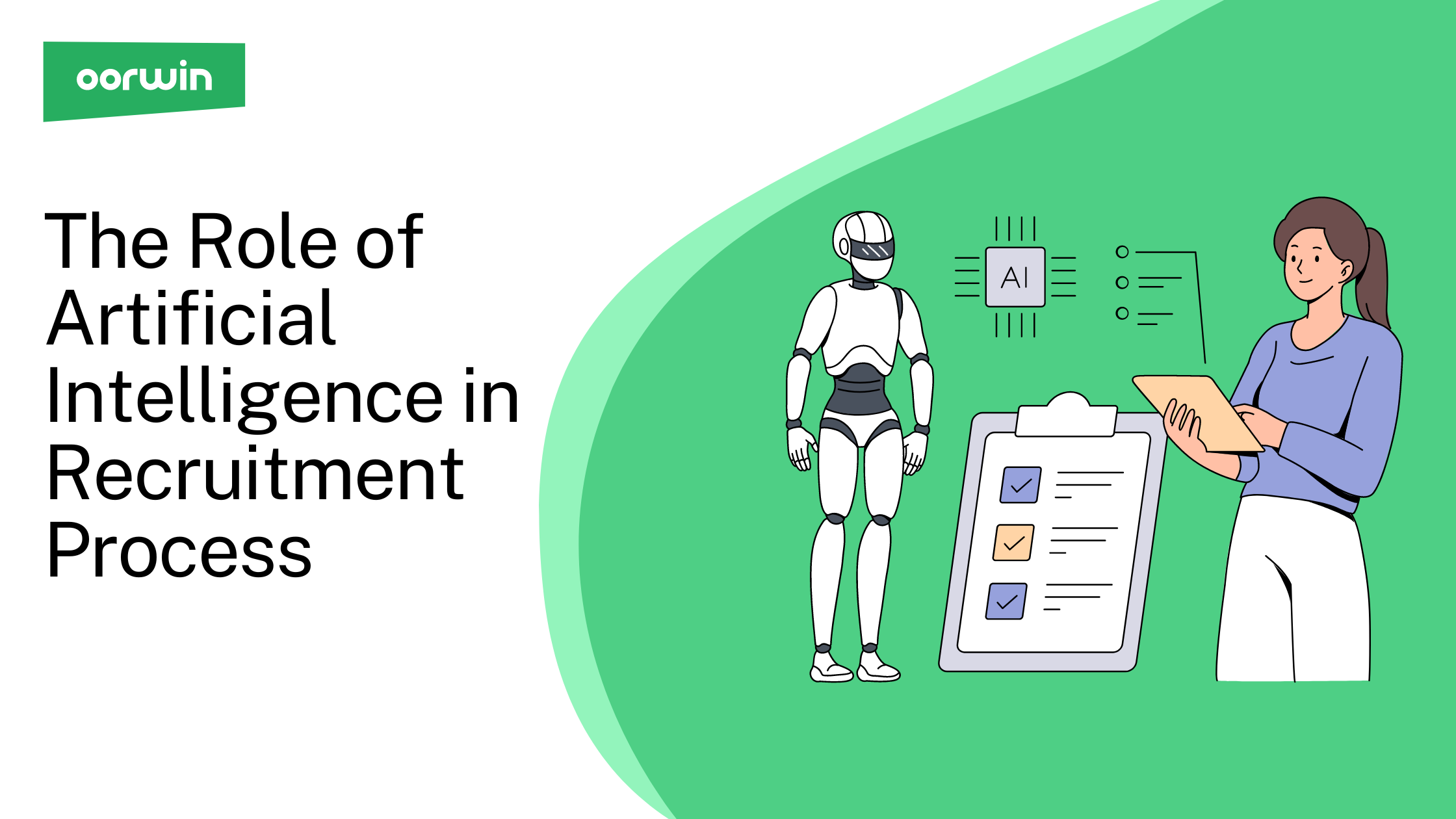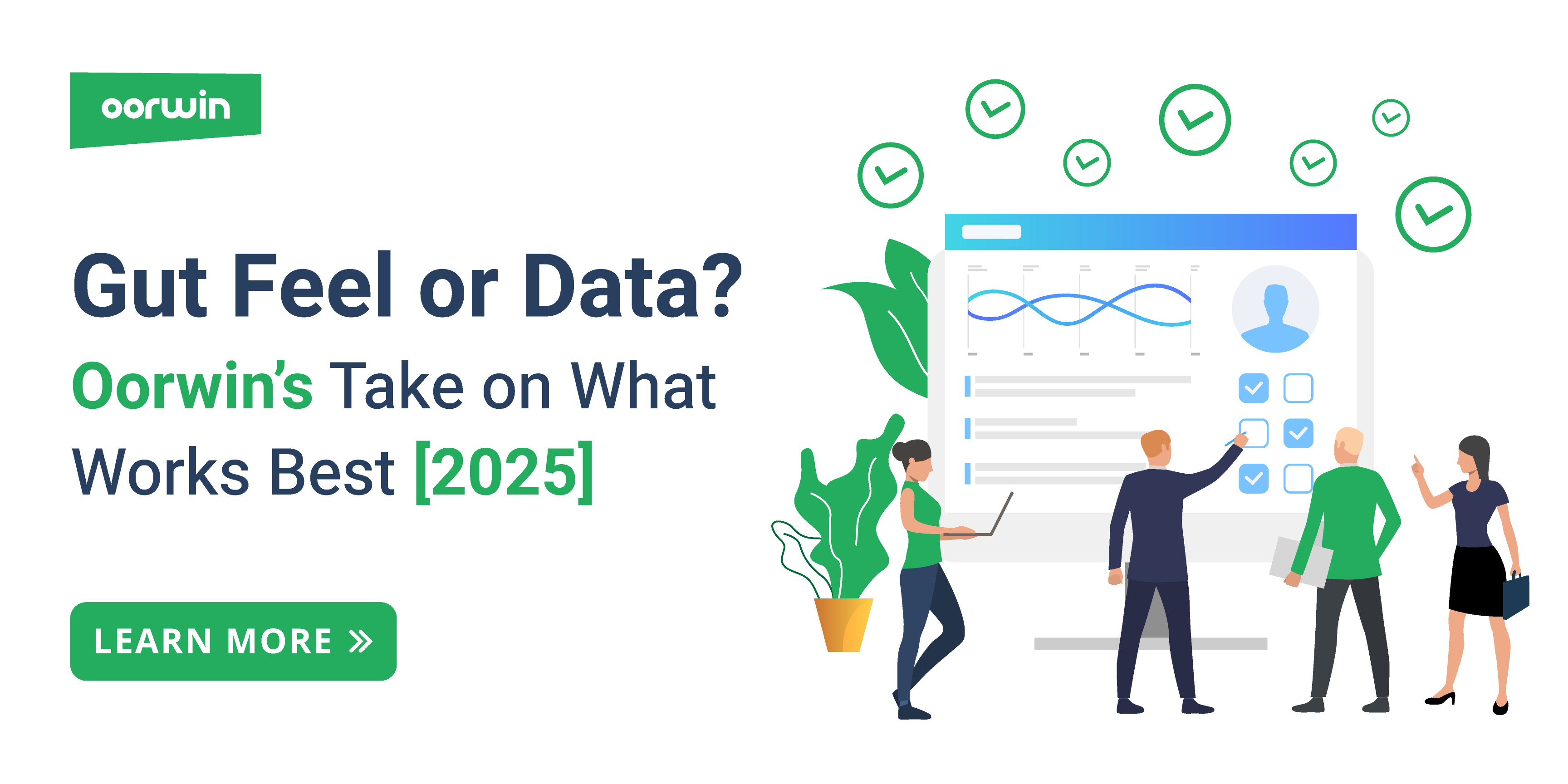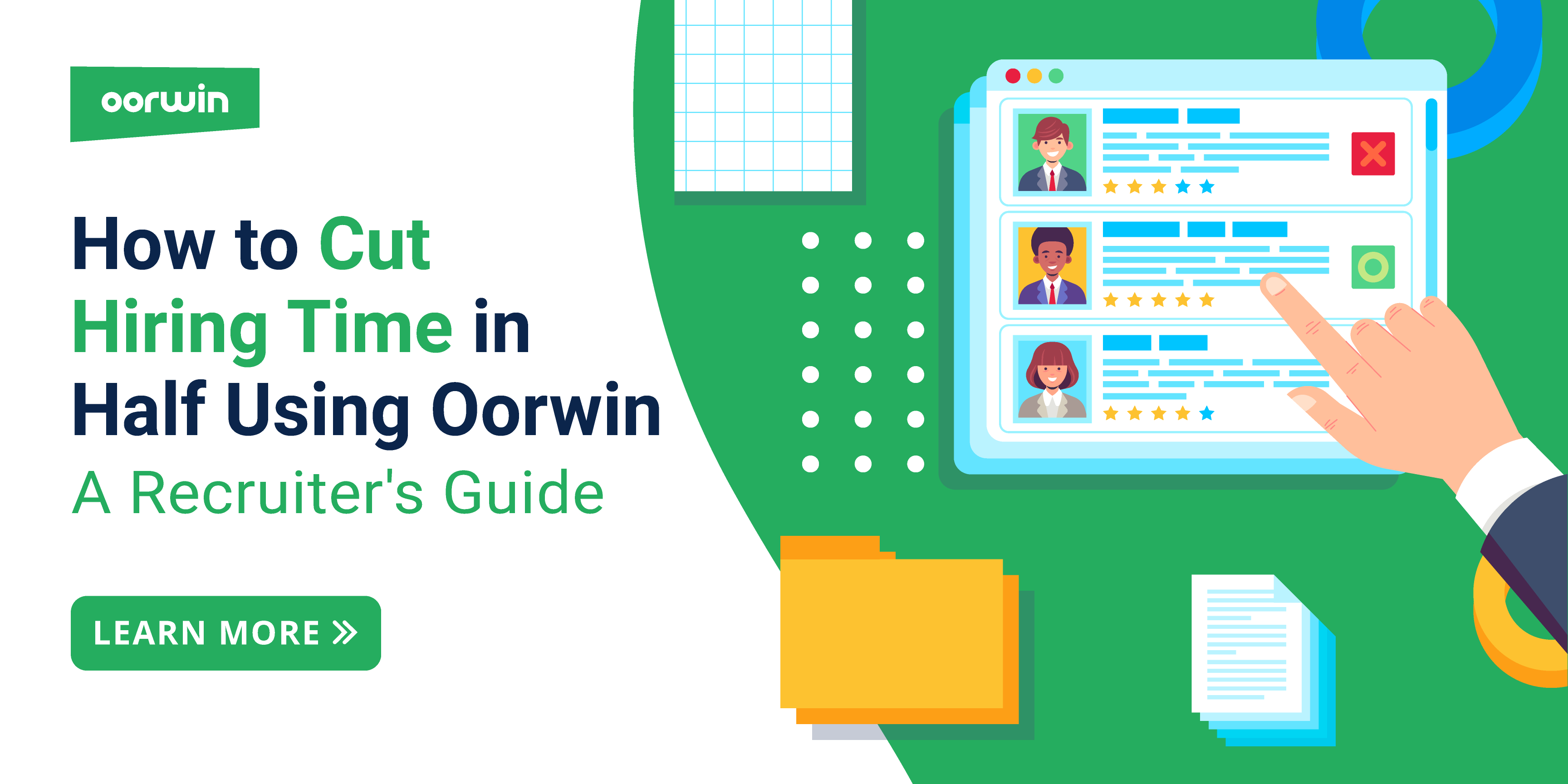The Role of Artificial Intelligence in Recruitment Process
Oorwin
10min read / 28 Feb 2024

Related Articles
AI in Recruitment: A New Era for Talent Acquisition
In the dynamic world of talent acquisition, the advent of Artificial Intelligence (AI) is revolutionizing how organizations search for, evaluate, and hire candidates. This innovative shift towards AI-driven recruitment processes heralds a new era, promising unprecedented efficiency and effectiveness in connecting with the right talent.
The Evolution of Recruitment Technologies
The recruitment industry has transformed from traditional, manual processes to sophisticated, technology-driven approaches. Initially, the focus was on personal networks and print advertising, gradually shifting to online job boards and applicant tracking systems. Today, we stand at the cusp of a new revolution with AI, automating and enhancing tasks that once required extensive human intervention. This evolution signifies a change in tools and a fundamental shift in strategy, enabling a more proactive and data-informed approach to talent acquisition.
Key AI Technologies in Recruitment Today
AI technologies are revolutionizing the recruitment landscape, offering innovative solutions that streamline the hiring process, enhance candidate engagement, and ensure more accurate matches between job seekers and positions, transforming how organizations approach talent acquisition.
1. AI in Candidate Sourcing
AI-powered sourcing tools are revolutionizing the way recruiters find talent. These tools can identify potential candidates faster than traditional methods by analyzing vast data from online profiles, resumes, and job postings. They can also reach passive candidates who are not actively looking for a new job but are open to opportunities, thus significantly widening the talent pool.
2. Resume Parsing and Screening
Resume parsing and screening technology automates the tedious task of reviewing applications. It uses natural language processing (NLP) and machine learning to analyze resumes, extracting relevant information such as skills, experience, and education. This allows recruiters to quickly identify the most promising candidates, significantly reducing the time spent on manual screening and enabling a focus on engaging with top talent.
3. Chatbots for Candidate Engagement
Chatbots are transforming candidate engagement by providing immediate, personalized interactions. These AI-driven assistants can answer queries, schedule interviews, and even provide feedback, offering a seamless experience for candidates. By handling routine inquiries, chatbots free up recruiters to concentrate on more strategic aspects of their role, enhancing the overall efficiency of the recruitment process.
4. AI in Interview Scheduling
AI is simplifying the logistics of interview scheduling by automating the coordination between candidates and hiring teams. Intelligent systems can analyze calendars, propose suitable times, and manage rescheduling, removing a significant administrative burden. This speeds up the process and improves the candidate experience, making it easier for top talent to engage with potential employers.
5. Predictive Analytics in Hiring
Predictive analytics uses historical data and machine learning to forecast hiring outcomes. By analyzing patterns and trends from past recruitment cycles, AI can predict which candidates will likely succeed in a role, helping recruiters make more informed decisions. This technology can also identify potential issues in the hiring process, allowing for continuous improvement and more effective talent acquisition strategies.
6. Video Interview Analysis
AI-driven video interview analysis offers a deeper insight into candidates’ verbal and non-verbal communication, assessing factors like speech patterns, facial expressions, and body language. This technology objectively assesses a candidate’s suitability for a role, complementing traditional evaluation methods and helping to eliminate unconscious bias from the recruitment process.
Benefits of Using AI in Recruitment Processes
Integrating AI into recruitment processes brings numerous advantages, including increased efficiency, improved candidate quality, enhanced decision-making, and reduced biases, fundamentally changing how organizations identify, attract, and hire top talent.
1. Streamlining the Hiring Workflow
AI streamlines recruitment by automating routine tasks such as resume screening, interview scheduling, and candidate communication. This speeds up the hiring process and allows recruiters to allocate more time to engage with candidates and strategic planning. The result is a more efficient workflow that can adapt quickly to the dynamic needs of the organization and the job market.
2. Enhancing Candidate Matching Accuracy
AI improves the accuracy of candidate-job matching through sophisticated algorithms that analyze various data points, from skills and experience to cultural fit and career aspirations. This precision reduces the likelihood of mismatches, leading to more successful hires and reducing turnover. It also ensures that the recruitment effort focuses on candidates genuinely suited to the role and organization.
3. Automating Routine Tasks
Automating routine tasks is one of AI’s most significant contributions to recruitment. By handling administrative duties such as data entry, scheduling, and initial candidate communication, AI frees up recruiters to focus on the human aspects of their role, such as interviewing and building relationships with candidates. This not only improves efficiency but also enhances the quality of the recruitment process.
4. Improving Candidate Experience
AI-enhanced recruitment processes offer a more engaging and responsive candidate experience. From chatbots that provide instant communication to personalized job recommendations and streamlined application processes, AI ensures that candidates feel valued and engaged throughout their journey. A positive candidate experience is crucial in attracting top talent and building a strong employer brand.
5. Reducing Unconscious Bias
AI tools can help reduce unconscious bias in recruitment by providing a more objective assessment of candidates based on skills and experience rather than subjective criteria. By minimizing human bias, organizations can ensure a more diverse and inclusive workforce, which has been shown to enhance creativity, innovation, and company performance. AI can thus play a critical role in promoting equality in the hiring process.
6. Leveraging Big Data for Recruitment Decisions
Big data analytics, powered by AI, enables recruiters to make more informed decisions by providing insights into trends, talent pools, and the effectiveness of recruitment strategies. This data-driven approach allows for optimizing recruitment efforts, ensuring that resources are allocated efficiently and strategies are aligned with the organization’s long-term goals. It’s a game-changer in strategic talent acquisition.
Addressing Recruitment Challenges with AI
AI is not just about enhancing existing processes; it’s also about overcoming longstanding challenges in recruitment:
- Enhancing Job Matching Accuracy: AI can revolutionize how job seekers are matched with positions by deeply analyzing job descriptions and the nuanced aspects of applicants’ profiles. This goes beyond basic qualifications to encompass personality traits, cultural fit, and long-term career aspirations. By harnessing AI’s ability to sift through complex data and detect patterns, recruiters can ensure a higher compatibility between the candidate and the role, which can lead to increased job satisfaction and lower turnover rates.
- Streamlining Remote Hiring Processes: As remote work becomes more prevalent, AI is pivotal in optimizing the recruitment process for geographically dispersed candidates. AI-powered tools can automate aspects of the virtual recruitment process, from identifying candidates in different time zones to facilitating remote interviews with integrated assessment tools. This use of AI not only makes it feasible to manage hiring across borders but also helps organizations tap into a global talent pool, enhancing the quality of hires and promoting a more diverse workplace.
The Future of AI in Recruitment: Continuous Learning and Adaptation of AI Systems
The future of AI in recruitment lies in its ability to learn and adapt continuously. As AI systems are exposed to more data and feedback, they become increasingly sophisticated in their analyses and predictions. This continuous improvement cycle promises to enhance further recruitment processes’ efficiency, effectiveness, and fairness. Moreover, as AI technologies evolve, they will offer even more innovative solutions to recruitment challenges, shaping a future where talent acquisition is more strategic, data-driven, and inclusive.
Selecting AI Tools for Recruitment: Is it Worth it?
Investing in AI tools for recruitment is a strategic decision that can offer significant returns. The benefits of AI in streamlining processes, enhancing decision-making, and improving candidate experiences are clear. However, organizations must carefully evaluate the tools and technologies that align with their recruitment goals and challenges. With the right AI solutions, companies can optimize their recruitment processes and gain a competitive edge in attracting and retaining the best talent.
Start Your AI-Enabled Journey with Oorwin
Embarking on an AI-enabled recruitment journey is a significant, forward-thinking step for any organization aiming to stay ahead in the competitive talent market.
Transforming Recruitment with Oorwin’s AI Powered Capabilities
Integrating AI-driven ChatGPT and AI technology from Oorwin revolutionizes recruitment process with the following capabilities.
- ChatGPT Integration: Oorwin’s ChatGPT streamlines recruitment by handling queries, offering job insights, and ensuring a seamless candidate experience.
- Enhanced Candidate Matching with AI: Oorwin’s AI efficiently matches candidates to job openings, reducing manual screening time and enhancing recruitment efficiency.
- AI-Driven Workflow Optimization: Oorwin’s AI optimizes recruitment workflows, managing tasks and accelerating processes to allow focus on strategic initiatives.
- AI-Powered Interview Scheduling: Oorwin’s AI simplifies interview scheduling, enabling candidates to choose preferred times and coordinating with interviewers to streamline the process.
- Strategic Candidate Sourcing with AI: Oorwin’s advanced AI tools enhance sourcing strategies by utilizing data analytics and predictive algorithms.
Streamline Recruitment with Oorwin’s AI Fit Score
Use Oorwin’s AI to simplify your recruitment process. Our system carefully reviews each candidate’s resume against job requirements and quickly provides an AI Fit Score to identify the best candidates. Focus your efforts more effectively and save time and resources with Oorwin.
Unbiased Screening with Oorwin’s AI-Powered Evaluation
Remove biases from your recruitment with Oorwin’s AI-powered evaluations. By objectively analyzing each applicant’s skills and experience, Oorwin’s AI promotes a fair and balanced hiring process. This helps you uncover untapped talent and build a more diverse team.
Empower Decision-Making with Oorwin’s AI-Powered Insights
Improve your decision-making with insights from Oorwin’s AI Fit Score. Oorwin’s AI offers valuable information beyond traditional resumes, helping you make well-informed choices to assemble a top-performing team that fits your company’s unique needs.
Ultimately, Oorwin’s technology supports an efficient hiring environment that is deeply committed to diversity and inclusion, which aligns well with today’s workplace values.
By starting your AI journey with Oorwin, you position your organization to redefine the recruitment landscape, ensuring you attract and retain the best talent through a more intelligent, data-driven approach. This is not just an upgrade to your recruitment process; it’s a leap toward future-proofing your organization’s talent management strategy. Click on the banner to learn more.
FAQs
How does AI impact the recruitment process?
AI impacts the recruitment process by automating routine tasks, enhancing candidate sourcing, and improving the efficiency of resume screening and candidate assessment. This leads to a faster, more efficient hiring process and a better match between job requirements and applicant skills.
Can AI and automation improve the quality of candidate matches?
AI and automation significantly improve the quality of candidate matches by analyzing vast amounts of data to identify patterns and preferences that might not be apparent through traditional methods. This results in more accurate matching of candidates to job specifications.
What role does automation play in streamlining the hiring workflow?
Automation streamlines the hiring workflow by taking over time-consuming tasks such as scheduling interviews, sending follow-up emails, and sorting through applications. This allows recruiters to focus on more strategic aspects of their role, like engaging with top candidates.
Is AI biased in candidate selection?
In candidate selection, AI can be biased if the data it learns from is biased. However, when designed and monitored correctly, AI can help reduce human biases by consistently applying objective criteria, thus making the hiring process more equitable.
Popular Articles..
Blog

4min read / 25-Jun-2025
Master Effective Interview Techniques with Oorwin: A Step-by-Step Recruiter’s Guide
Blog
Blog
Get the latest Oorwin releases, updates, success stories & industry news
 Back
Back



